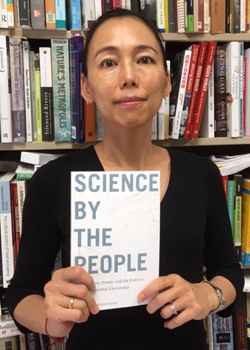
How are “citizen scientists” addressing the world’s most complex environmental problems in the U.S. and Japan? That question is at the heart of a new book by Aya H. Kimura, professor and undergraduate chair of sociology in the College of Social Sciences at the University of Hawaiʻi at Mānoa.
Kimura co-wrote Science by the People: Participation, Power, and the Politics of Environmental Knowledge, with fellow sociologist Abby Kinchy at Rensselaer Polytechnic Institute in New York. The book was published in September 2019 by Rutgers University Press.
Citizen scientists are members of the general public who collect and sometimes analyze data relating to the natural world, typically as part of a collaborative project with professional scientists. For example, in Hawaiʻi’s king-tides citizen-science project, local residents and visitors were asked to submit online photos to document high water levels and related impacts.

Kimura said Science by the People does not ask whether citizen science results in good scientific data or if it effectively manages, recruits and retains volunteers. Instead, it considers diverse examples of citizen science projects, including the impact of shale oil and gas development, genetically engineered crops and radioactive contamination after the 2011 Fukushima nuclear disaster in Japan. This book aims to help people negotiate a complex political landscape and choose paths moving toward social change and environmental sustainability.
“In our fieldwork, we have seen how citizen science can assist groups at the lower end of social hierarchy in gaining voice, legitimating their knowledge and claims, and participating in decision-making processes,” Kimura said. “We look at how they do this, and whether the tensions and choices involved in doing citizen science hinder others from achieving this potential.”
More about Kimura
Kimura is the award-winning author of books including Radiation Brain Moms and Citizen Scientists: The Gender Politics of Food Contamination after Fukushima, which won the 2019 Rachel Carson Award from the Society for Social Studies of Science, and Hidden Hunger: Gender and the Politics of Smarter Foods, which received the 2014 Fred Buttel Outstanding Scholarly Achievement Award from the Rural Sociological Society.
She holds a master’s degree in environmental studies from Yale University and a PhD in sociology from the University of Wisconsin-Madison. She joined UH Mānoa in 2007.

